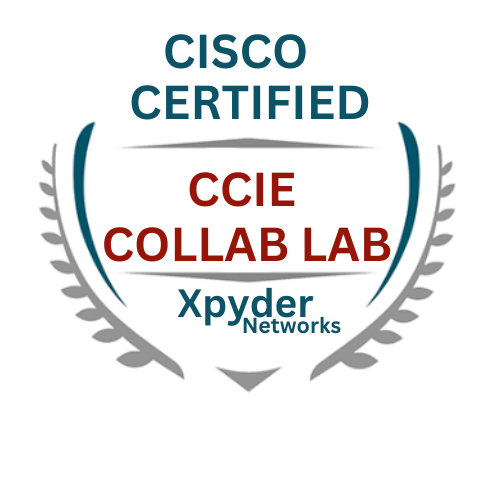Get Secure Study Materials for 100% pass!!
Get Now
CCIE Enterprise Dumps List
-
CATEGORIESEXAM TRACKSQUESTION NUMBERSPriceGET NOW
-
CCIE Collaboration Lab
CCIE Collaboration lab Exam With Xpyder
As of the latest available information, here are the details regarding the CCIE Collaboration (v3.1) certification:

Certification Overview:
Certification Name: Cisco Certified Internetwork Expert (CCIE) Collaboration
Current Version: 3.1
Prerequisites: There are no formal prerequisites in terms of required certifications, but candidates are expected to have a deep understanding of networking concepts and experience with collaboration technologies.
Exam: The certification process involves passing two exams:
Qualification Exam: This covers core enterprise infrastructure technologies and topics, similar to the scope of the lab exam but in a written format.
Lab Exam: Candidates must pass a rigorous hands-on lab exam that tests their ability to design, deploy, operate, and optimize complex enterprise infrastructure solutions.
Exam Topics (General Overview):
The CCIE Collaboration v3.1 covers a wide range of topics, including but not limited to:
Cisco Unified Communications Manager (CUCM)
Cisco Unity Connection (CUC)
Cisco Unified Contact Center Express (UCCX)
Cisco Expressway Series
Cisco Meeting Server
Cisco TelePresence Management Suite (TMS)
SIP and H.323 protocols
Voice and video codecs
Quality of Service (QoS) mechanisms for voice and video
Lab Exam Details:
The CCIE Collaboration lab exam is an 8-hour, hands-on practical exam.
It evaluates candidates' abilities to configure, troubleshoot, and optimize complex collaboration network scenarios.
Candidates are tested on their understanding and application of Cisco's collaboration technologies, including Cisco Unified Communications Manager, Cisco Unity Connection, Cisco Expressway, and various endpoints and video conferencing solutions.
The lab environment simulates a realistic collaboration network setup, requiring candidates to integrate multiple technologies and devices to meet specific collaboration requirements.
Recertification:
CCIE certifications are valid for three years.
To recertify, candidates can take and pass the current CCIE written exam or earn specified Continuing Education credits.
Preparation Resources:
Cisco offers official training courses and materials designed specifically to prepare candidates for both the written and lab exams.
Hands-on experience with Cisco collaboration technologies and extensive lab practice are crucial for success in the CCIE Collaboration lab exam.
For the most current and detailed information about CCIE Collaboration v3.1, including any updates or changes since my last update, please refer to Cisco's official certification website or contact Cisco directly.
Achieving the CCIE Collaboration (v3.1) certification offers several significant benefits for IT professionals specializing in Cisco collaboration technologies:
Expertise Validation: CCIE Collaboration certification validates your advanced skills and expertise in designing, deploying, managing, and troubleshooting complex collaboration solutions using Cisco technologies. It demonstrates your proficiency in integrating various collaboration components into cohesive and effective systems.
Global Recognition:CCIE certification is globally recognized as a prestigious credential in the IT industry, particularly in the field of collaboration technologies. It distinguishes you as a highly skilled professional capable of handling sophisticated collaboration environments and technologies.
Career Advancement: Holding a CCIE Collaboration certification can significantly enhance your career prospects. It opens doors to new job opportunities and positions you for senior-level roles such as Collaboration Engineer, Unified Communications Architect, or Collaboration Solutions Specialist within organizations that rely on Cisco collaboration solutions.
Industry Credibility: Employers value CCIE-certified professionals for their proven ability to design and manage complex collaboration networks effectively. This certification enhances your credibility and trustworthiness in the eyes of employers and clients.
Hands-On Experience: The CCIE Collaboration lab exam provides a rigorous hands-on experience with Cisco's collaboration technologies. This practical experience not only prepares you for real-world scenarios but also enhances your troubleshooting skills and ability to implement scalable solutions in a collaboration environment.
Access to Advanced Technologies: CCIE certification ensures you are proficient in Cisco's latest collaboration technologies and solutions, including Cisco Unified Communications Manager (CUCM), Cisco Unity Connection (CUC), Cisco Expressway, Cisco Meeting Server, and various voice and video endpoints. This knowledge keeps you at the forefront of collaboration innovation.
Professional Development: Pursuing CCIE certification requires continuous learning and staying updated with the latest advancements in collaboration technologies. This ongoing professional development ensures your skills remain relevant and valuable in the dynamic field of collaboration networking.
Higher Earning Potential: CCIE-certified professionals often command higher salaries compared to their non-certified counterparts. Employers recognize the value of CCIE Collaboration certification and are willing to offer competitive compensation packages to skilled professionals who hold this credential.
Networking Opportunities: Being part of the CCIE community provides access to a network of peers, experts, and resources in the collaboration domain. This network can be invaluable for sharing knowledge, discussing best practices, and staying informed about industry trends and innovations.
Personal Satisfaction: Achieving CCIE Collaboration certification is a significant achievement that brings personal satisfaction and pride. It represents your dedication to mastering advanced collaboration technologies and your commitment to excellence in your profession.
FAQ
1.After purchase, how do I access the products?
At Xpyder Networks, we offer all certification exam dumps. After payment, our sales team will promptly send you the purchased dumps. Additionally, our Xpyder Team provides certification training and creates study plans to ensure your success in passing the exam.
2.Are the Practice Tests updated regularly?
Yes, we update the Practice Tests regularly to ensure they align with the latest exam content and trends.
3.What are the products offered by Xpyder Networks?
We provide genuine exam questions and answers for Cisco CCNA, CCNP, CCIE, ISACA, PMP, AWS, and other IT exams, along with CCIE Lab & Huawei training courses. Contact us to receive the PDF of all certification exam questions.
4.How frequently do you update your products?
Our Product Team conducts weekly reviews of all our products. Should any certification vendor alter exam questions, we promptly update our products to align with these changes.
5.Are updates included free of charge?
We give free updates while you're using our service.
6.How can I renew my expired subscription?
If your subscription expires, you can pay a fee to extend it.